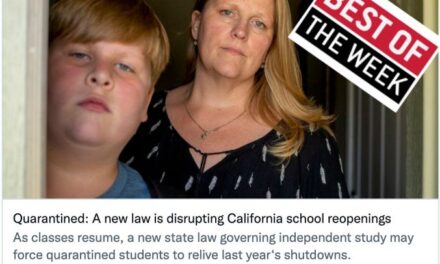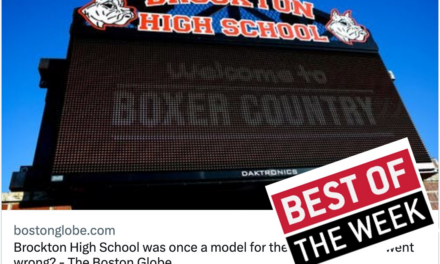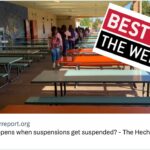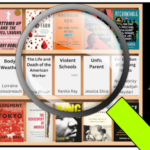By Alexander Russo
This month’s best include a New York Times story about district effectiveness and coverage of the Newtown school shooting anniversary. This month’s worst include NPR’s refusal to correct its initial Ballou high school miracle story and the teeth-gnashingly bad Associated Press school segregation story. Check it all out below:

BIG VARIATIONS IN DISTRICT EFFECTIVENESS
Leading December’s roundup is Emily Badger’s New York Times piece, How Effective Is Your School District? A New Measure Shows Where Students Learn the Most.
In the piece, Badger covers new research from Stanford from Stanford that examines how much students learn over time by measuring their test scores throughout their schooling in different districts. “Some urban and Southern districts are doing better than data typically suggests. Some wealthy ones don’t look that effective,” writes Badger. “This picture, and Chicago’s place in it, defy how we typically think about wealth and education in America.”
Since then, outlets including WNYC, ChalkbeatNY, Slate, US News, Tulsa World, the Chicago Tribune, and the Washington Post have also covered the Stanford findings. Mother Jones’ Kevin Drum wrote up the study, too, focusing on highlights (like Tennessee) and underperformers (like Baltimore, LA, and Atlanta).
Crossed fingers more education reporters will find time to report out these fascinating findings in early 2018. We’re looking at you, Wall Street Journal, Chalkbeat national, LA Times, and Associated Press.
NEWTOWN ANNIVERSARY
This year’s Newtown anniversary produced some stellar journalism, including the Washington Post’s The legacy of Newtown, ABC News’ Sandy Hook’s legacy: More security in elementary schools, and the Naples Daily News’ Sandy Hook, Immokalee school pen pals still writing five years later. Since Newtown, school shootings have become something common, and December saw another shooting on the 7th in New Mexico. TIME covered that shooting in Not a drill. Students hid in classrooms as shooter kills 2 at school.
It’s four years old, but Eli Saslow’s Washington Post story about the aftereffects of the mass killings is still worth reading. Headlined After Newtown shooting, mourning parents enter into the lonely quiet, it’s “still one of best pieces of journalism I’ve ever read,” says Erica Green of the New York Times. Reading it again this year, we fullheartedly agree.
To get The Grade’s weekly email roundup of best education news, subscribe here. For more superb journalism from throughout the year, check out The Grade’s Best Education Journalism of 2017.

“MIRACLE” SCHOOL COVERAGE
In early December, NPR public editor posted a review of NPR’s reporting on Ballou high school, and she didn’t seem entirely convinced that the original story should have been given the green light or that the clarification provided since then was enough. Education historian Diane Ravitch described the Ballou story as “A touching story. But a false story. Made even worse by the fact that it was reported by NPR, which is a usually reliable and trustworthy source for news.” (Ravitch weighed in again just a couple of days ago.) Meanwhile, the 74’s Beth Hawkins highlighted a Minneapolis high school with a similarly questionable turnaround story that was reported last spring in the Minneapolis Star-Tribune.
AP SEGREGATION CONTROVERSY
The AP’s early December story about charter schools and school segregation generated howls of outrage from charter advocates and even some polite complaints from a few journalists. Among the many issues raised by the piece have been concerns about the research being used and the lack of context around the nation’s long-established problems with school segregation. One other question is whether the story might be an example of racial and cultural blind spots in journalism. The piece not only claims that integration is the sole research-proven way to address education inequality, which is a claim not everyone would agree on, but also presumes that integration is a priority for all groups of parents.
SURPRISINGLY POOR ATTEMPT AT NATIONAL COVERAGE FROM CHALKBEAT
In Chalkbeat, Matt Barnum penned a problematic overview of “a loosely connected network of nonprofit groups … working to reshape the way their school districts function.” Perhaps the most obvious of several problems is Barnum’s top section claim that the portfolio approach is spreading nationally when the second half of the piece is full of problems and setbacks. The piece gives readers no real historical or financial context in which to understand the network whose work he describes. Chalkbeat is still new at national education news, so perhaps this is just an early stumble.
MISSING DATA IN PROPUBLICA STORY
A recent piece from ProPublica links involuntary placements in alternative schools to the Trump administration and the idea of school choice – even though this practice predates the current administration by decades. The piece fails to say whether it’s on the rise or falling.
Read the November roundup here. Follow @thegrade_ to learn more about media coverage of education issues. Sign up for the newsletter here.
ABOUT THE AUTHOR

Alexander Russo
Alexander Russo is founder and editor of The Grade, an award-winning effort to help improve media coverage of education issues. He’s also a Spencer Education Journalism Fellowship winner and a book author. You can reach him at @alexanderrusso.
Visit their website at: https://the-grade.org/













